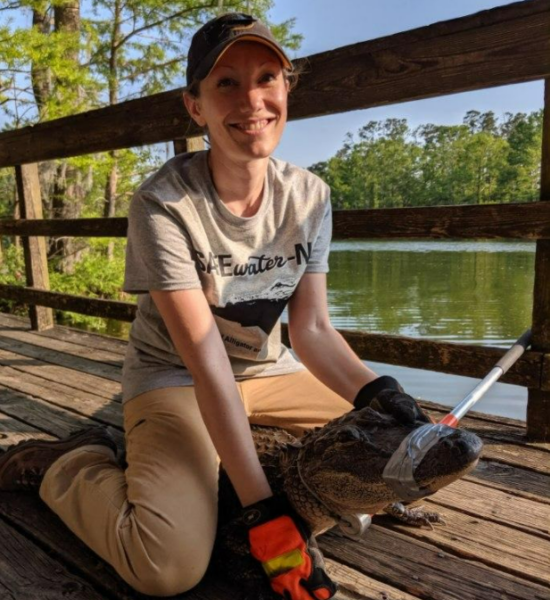
Kylie Rock, Trainee in Project 3 with Scott Belcher, will present an oral poster on PFAS Toxicity entitled ‘PFAS Exposure Is Associated with Autoimmunity in the American Alligator‘, at the 2022 Society of Toxicology (SOT) Meeting in San Diego, CA.
Per- and polyfluoroalkyl substances (PFAS) are a diverse group of persistent chemical contaminants associated with immune disruption in humans. Environmental monitoring from the Cape Fear River (CFR) in North Carolina has revealed a growing number of novel replacement PFAS and manufacturing byproducts in water downstream from a production facility, raising concerns about their potential health impacts on local communities and wildlife. As a non-migratory long-lived apex predator, the American alligator serves as a predictive aquatic model or “sentinel species” of environmental hazards, including the long-term adverse effects of persistent toxic pollutants. Here we present a comparative PFAS exposure and immune health study of alligators from sites in North Carolina that are deferentially contaminated by PFAS. Using liquid chromatography and high-resolution mass spectrometry we determined the concentrations of 23 different PFAS present in serum samples from 76 adult and juvenile alligators. The geometric mean concentration of total PFAS detected in CFR alligator serum (M = 36.96 ± 4.12 ng/ml) was significantly increased compared to alligators sampled at our reference site, Lake Waccamaw (LW; M = 6.97 ± 2.50 ng/ml). Serum total PFAS concentrations were positively correlated with biomarkers of innate immune response, including increased lysozyme and complement activity. We also observed decreased clotting, increases in helmet cells, and high expression, in some cases >400-fold induction, of type 1 interferon responsive genes (Rsad2, Cxcl10, Mx1, Oas1) in CFR alligators. These findings suggest that PFAS exposure broadly alters immune activities leading to hallmark phenotypes of human autoimmune disease in alligators.
You can see Kylie in person at the SOT, discussing this presentation on Wednesday, March 30, 2022, 1:30pm-1:15pm (Pacific), CC Room 8.
